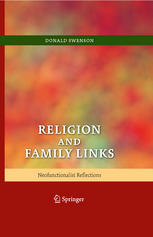

Most ebook files are in PDF format, so you can easily read them using various software such as Foxit Reader or directly on the Google Chrome browser.
Some ebook files are released by publishers in other formats such as .awz, .mobi, .epub, .fb2, etc. You may need to install specific software to read these formats on mobile/PC, such as Calibre.
Please read the tutorial at this link: https://ebookbell.com/faq
We offer FREE conversion to the popular formats you request; however, this may take some time. Therefore, right after payment, please email us, and we will try to provide the service as quickly as possible.
For some exceptional file formats or broken links (if any), please refrain from opening any disputes. Instead, email us first, and we will try to assist within a maximum of 6 hours.
EbookBell Team

5.0
60 reviewsReligion and Family Links
by Donald Swenson, Mount Royal College, Calgary, Alberta, Canada
For many, the experience of religion and the family are organically connected: first exposure to religion often comes through the family, and, in families that practice a religion, it often has a shaping effect on their traditions, roles, practices, or structure. The author of this text captures the important relationship between religion and the family with a review of relevant literature on the subject, synthesizing it within a theoretical framework. The work begins with an introduction to the neofunctionalist theoretical framework of the family. This framework is connected to a multidimensional understanding of religion. With a focus on systems and a holistic interpretation of religion, the author uses a systems approach to construct a synthesis of the salient literature on the link between religion and the family.
Four systems that are embedded in the Neofunctionalist theoretical framework are presented: the chronosystem (including time and history), the organic system (that which is part of our biology), the personality system (with an accent on the individual in social context), the social system (everything to do with relationships and social organizations) and the cultural system (including mythology and ethos).
These systems are unified by common religious concepts, including: the idea of the sacred, religious experience, ritual, ethos and sacred organizations. The author uses historical and modern examples from folk religion, Christianity, Judaism and Islam, creating a comprehensive resource for understanding the links between these two important social phenomena.